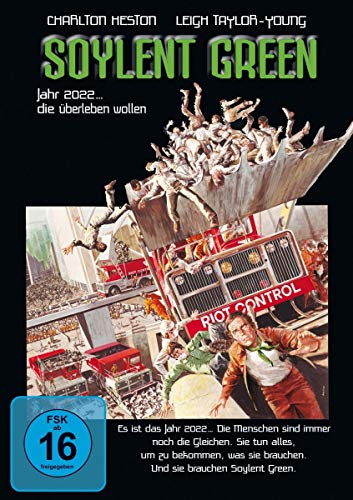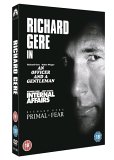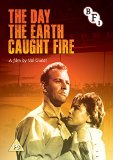![Annie / Oliver / Matilda / Madeline [DVD]](/pictures/1152481.jpg) Annie / Oliver / Matilda / Madeline | DVD | (16/11/2015)
from £9.98
| Saving you £N/A (N/A%)
| RRP
Annie / Oliver / Matilda / Madeline | DVD | (16/11/2015)
from £9.98
| Saving you £N/A (N/A%)
| RRP Collection of four classic children's films. 'Annie' (1982) is the story of the eponymous optimistic orphan (Aileen Quinn) who lives a miserable life in an children's home run by the awful Miss Hannigan (Carol Burnett). One day, she sees her chance to escape and sets off on a journey which will take her to the door of childless millionaire Daddy Warbucks (Albert Finney). In 'Oliver' (1968) young Oliver Twist (Mark Lester) escapes from the workhouse, where he has been brutally treated all of his life, and joins the gang of street urchins led by the rascal Fagin (Ron Moody). Oliver is trained as a pick-pocket, but ends up being caught for a crime he did not commit. However, this seemingly unfortunate accident brings him closer to his real family. 'Matilda' (1996) stars Mara Wilson as the exceptionally gifted and intelligent child who is ignored by her stupid parents Harry (Danny DeVito) and Zinnia (Rhea Perlman). A keen reader, her dearest wish is to be sent to school, but the establishment Harry selects is Crunchemhall, run by the tyrannical Miss Trunchball (Pam Ferris). Her cruelty to her pupils causes Matilda to vow revenge, and her newly discovered telekinetic powers give her the chance to do so. 'Madeline' (1998) stars Hatty Jones as the most mischievous of the twelve friends who live at a Parisian school run by Miss Clavel (Frances McDormand). Her sunny existence is threatened by starchy old Lord Covington (Nigel Hawthorne) who is on a campaign to have the school closed down. It is up to Madeline and her friends, who include the equally precocious Pepito (Kristian de la Osa) and a dog who saved her from drowning, to stop him.
 Howard's Way - Series 2 | DVD | (19/06/2006)
from £19.22
| Saving you £10.77 (56.04%)
| RRP
Howard's Way - Series 2 | DVD | (19/06/2006)
from £19.22
| Saving you £10.77 (56.04%)
| RRP Maurice Colborne (Gangsters) stars as Tom Howard recently made redundant as an aircraft designer who decides to ply his trade in the world of boats instead; taking the reigns at a run-down local construction yard. A family of considerable wealth and prestige the Howards struggle to come to terms with Tom's decision and the changing circumstances of their lives. Featuring all the episodes from Series 2.
![All My Sons (Limited Edition) [Blu-ray]](/pictures/1169703.jpg) All My Sons (Limited Edition) | Blu Ray | (26/01/2026)
from £19.98
| Saving you £N/A (N/A%)
| RRP
All My Sons (Limited Edition) | Blu Ray | (26/01/2026)
from £19.98
| Saving you £N/A (N/A%)
| RRP Irving Reis (The Big Street) directs a stellar cast including Edward G Robinson (Night Has a Thousand Eyes) and Burt Lancaster (Kiss the Blood Off My Hands) in the film noir classic All My Sons. Joe Keeler (Robinson) frames his business partner Herb (Frank Conroy, The Snake Pit) when a shipment of faulty aeroplane components leads to the death of several pilots. After the war, his son Chris (Lancaster) is engaged to Herb's daughter Ann (Louisa Horton, Walk East on Beacon), and family tensions begin to rise... Adapted from the hit Broadway play by Arthur Miller (Death of a Salesman), and photographed by the great Russell Metty (Undertow), All My Sons is a fascinating exploration of betrayal and guilt.
![Master and Commander: The Far Side of the World (Single Disc Edition) [2003]](/pictures/1001669.jpg) Master and Commander: The Far Side of the World (Single Disc Edition) | DVD | (05/04/2004)
from £4.90
| Saving you £11.09 (226.33%)
| RRP
Master and Commander: The Far Side of the World (Single Disc Edition) | DVD | (05/04/2004)
from £4.90
| Saving you £11.09 (226.33%)
| RRP Russell Crowe stars as "Lucky" Jack Aubrey, who pits his crew of the HMS Surprise against a much better armed and ruthless enemy in a chase that takes him all the way to the far side of the world.
![Double Indemnity [Masters of Cinema] (Blu-ray)](/pictures/1113973.jpg) Double Indemnity | Blu Ray | (25/06/2012)
from £17.25
| Saving you £4.00 (25.02%)
| RRP
Double Indemnity | Blu Ray | (25/06/2012)
from £17.25
| Saving you £4.00 (25.02%)
| RRP Director Billy Wilder (Sunset Boulevard) and writer Raymond Chandler (The Big Sleep) adapted James M. Cain's hard-boiled novel into this wildly thrilling story of insurance man Walter Neff (Fred MacMurray), who schemes the perfect murder with the beautiful dame Phyllis Dietrichson (Barbara Stanwyck: kill Dietrichson's husband and make off with the insurance money. But, of course, in these plots things never quite go as planned, and Barton Keyes (Edward G. Robinson) is the wily insurance investigator who must sort things out. From the opening scene you know Neff is doomed, as the story is told in flashback; yet, to the film's credit, this doesn't diminish any of the tension of the movie. This early film noir flick is wonderfully campy by today's standards, and the dialogue is snappy ("I thought you were smarter than the rest, Walter. But I was wrong. You're not smarter, just a little taller"), filled with lots of "dame"s and "baby"s. Stanwyck is the ultimate femme fatale, and MacMurray, despite a career largely defined by roles as a softy (notably in the TV series My Three Sons and the movie The Shaggy Dog), is convincingly cast against type as the hapless, love-struck sap. --Jenny Brown
 Soylent Green | DVD | (18/09/2003)
from £N/A
| Saving you £N/A (N/A%)
| RRP
Soylent Green | DVD | (18/09/2003)
from £N/A
| Saving you £N/A (N/A%)
| RRP ![American History X [1999]](/pictures/1020712.jpg) American History X | DVD | (25/10/1999)
from £5.03
| Saving you £14.96 (297.42%)
| RRP
American History X | DVD | (25/10/1999)
from £5.03
| Saving you £14.96 (297.42%)
| RRP Perhaps the highest compliment you can pay to Edward Norton is that his Oscar-nominated performance in American History X nearly convinces you that there is a shred of logic in the tenets of white supremacy. If that statement doesn't horrify you, it should; Norton is so fully immersed in his role as a neo-Nazi skinhead that his character's eloquent defense of racism is disturbingly persuasive--at least on the surface. Looking lean and mean with a swastika tattoo and a mind full of hate, Derek Vinyard (Norton) has inherited racism from his father, and that learning has been intensified through his service to Cameron (Stacy Keach), a grown-up thug playing tyrant and teacher to a growing band of disenfranchised teens from Venice Beach, California, all hungry for an ideology that fuels their brooding alienation. The film's basic message--that hate is learned and can be unlearned--is expressed through Derek's kid brother, Danny (Edward Furlong), whose sibling hero-worship increases after Derek is imprisoned (or, in Danny's mind, martyred) for the killing of two black men. Lacking Derek's gift of rebel rhetoric, Danny is easily swayed into the violent, hateful lifestyle that Derek disowns during his thoughtful time in prison. Once released, Derek struggles to save his brother from a violent fate, and American History X partially suffers from a mix of intense emotions, awkward sentiment and predictably inevitable plotting. And yet British director Tony Kaye (who would later protest against Norton's creative intervention during post-production) manages to juggle these qualities--and a compelling clash of visual styles--to considerable effect. No matter how strained their collaboration may have been, both Kaye and Norton can be proud to have created a film that addresses the issue of racism with dramatically forceful impact. --Jeff Shannon, Amazon.com
![Paris, Texas [1984]](/pictures/1006037.jpg) Paris, Texas | DVD | (02/09/2002)
from £21.00
| Saving you £-1.01 (N/A%)
| RRP
Paris, Texas | DVD | (02/09/2002)
from £21.00
| Saving you £-1.01 (N/A%)
| RRP Something like a perfect artistic union is achieved in the major components of Paris, Texas: the twang of Ry Cooder's guitar, the lonely light of Robbie Muller's camera, the craggy landscape of Harry Dean Stanton's face. In his greatest role, longtime character actor Stanton plays a man brought back to his old life after wandering in the desert (or somewhere) for four years. He has a 7-year-old son to get to know, and his wife has gone missing. The material is much in the wanderlust spirit of director Wim Wenders, working from a script by Sam Shepard and L.M. Kit Carson. If the long climactic conversation between Stanton and Nastassja Kinski renders the movie uneven and slightly inscrutable, it's hard to think of a more fitting ending--and besides, the achingly empty American spaces stick longer in the memory than the dialogue. Winner of the top prize at the 1984 Cannes Film Festival. --Robert Horton
![Battlestar Galactica: The Plan [Blu-ray]](/pictures/1118812.jpg) Battlestar Galactica: The Plan | Blu Ray | (08/10/2012)
from £N/A
| Saving you £N/A (N/A%)
| RRP
Battlestar Galactica: The Plan | Blu Ray | (08/10/2012)
from £N/A
| Saving you £N/A (N/A%)
| RRP The Cylons began as humanity's robot servants. They rebelled and evolved and now they look like us. Their plan is simple: destroy the race that enslaved them. But when their devastating attack leaves human survivors, the Cylons have to improvise. Battlestar Galactica: The Plan tells the story of two powerful Cylon leaders, working separately, and their determination to finish the task. Special Features: Deleted Scenes Audio Commentary Featurettes
![Fail Safe (1965) [Criterion Collection] UK Only [Blu-ray] [2019] [Region Free]](/pictures/1150815.jpg) Fail Safe (1965) | Blu Ray | (03/02/2020)
from £17.99
| Saving you £N/A (N/A%)
| RRP
Fail Safe (1965) | Blu Ray | (03/02/2020)
from £17.99
| Saving you £N/A (N/A%)
| RRP This unnerving procedural thriller painstakingly details an all-too-plausible nightmare scenario in which a mechanical failure jams the United States military's chain of command and sends the country hurtling toward nuclear war with the Soviet Union. Working from a contemporary best seller, screenwriter WALTER BERNSTEIN (The Front) and director SIDNEY LUMET (Network) wrench harrowing suspense from the doomsday fears of the Cold War era, making the most of a modest budget and limited sets to create an atmosphere of clammy claustrophobia and astronomically high stakes. Starring HENRY FONDA (12 Angry Men) as a coolheaded U.S. president and WALTER MATTHAU (Charade) as a trigger-happy political theorist, Fail Safe is a long-underappreciated alarm bell of a film, sounding an urgent warning about the deadly logic of mutually assured destruction. Special Edition Features New 4K digital restoration, with uncompressed monaural soundtrack on the Blu-ray Audio commentary from 2000 featuring director Sidney Lumet New interview with film critic J. Hoberman on 1960s nuclear paranoia and Cold War films Fail-Safe Revisited, a short documentary from 2000 including interviews with Lumet, screenwriter Walter Bernstein, and actor Dan O'Herlihy PLUS: An essay by critic Bilge Ebiri
![The Battle Of Midway [Blu-ray]](/pictures/1146721.jpg) The Battle Of Midway | Blu Ray | (05/02/2018)
from £20.00
| Saving you £N/A (N/A%)
| RRP
The Battle Of Midway | Blu Ray | (05/02/2018)
from £20.00
| Saving you £N/A (N/A%)
| RRP An all-star dramatization of the Japanese attack on the island of Midway in 1942, which saw US forces finally wresting control of the waves and staving off the threat of its West Coast being invaded. Henry Fonda heads the cast as Pacific Fleet Commander Chester W. Nimitz.
![Tickle Me [1965]](/pictures/1090203.jpg) Tickle Me | DVD | (11/01/2010)
from £10.35
| Saving you £5.64 (54.49%)
| RRP
Tickle Me | DVD | (11/01/2010)
from £10.35
| Saving you £5.64 (54.49%)
| RRP New man in Zuni Wells. Handsome. Knows horses. Looking for part-time work until rodeo season opens. But when the ranch job Lonnie Beale snaps up turns out to be a stint at a dude ranch/spa for actresses and models and when the fella playing Lonnie is Elvis Presley it's a cinch we're all in for full-time fun! This film frolic tickles with a saddlebag of nine tunes including I'm Yours and (Such An) Easy Question). There's considerable tickling of the funnybone since writers Elwood Ullman and Edward Bernds are veterans of the Three Stooges comedies. Elvis enjoys his share of the laughs as he meets girl (Jocelyn Lane) loses girl and gets girl back plus a fortune in lost gold. Tickle Me is good as gold in so many ways.
 Richard Gere - An Officer And A Gentleman / Internal Affairs / Primal Fear | DVD | (10/10/2005)
from £18.15
| Saving you £1.84 (10.14%)
| RRP
Richard Gere - An Officer And A Gentleman / Internal Affairs / Primal Fear | DVD | (10/10/2005)
from £18.15
| Saving you £1.84 (10.14%)
| RRP An Officer And A Gentleman (Dir. Taylor Hackford 1981): Zack Mayo is a young loner with a bad attitude. Tempted by the glamour and admiration of the life of a Navy pilot he decides to sign up for Officer Candidate School. After thirteen tortuous weeks under Gunnery Sergeant Emil Foley (Gossett Jnr.) he slowly begins to learn the importance of discipline love and friendship. Foley warns Zack about the local girls who will do anything to catch themselves a pilot for a husband
![It Always Rains On Sunday [DVD]](/pictures/1117514.jpg) It Always Rains On Sunday | DVD | (12/11/2012)
from £7.99
| Saving you £8.00 (100.13%)
| RRP
It Always Rains On Sunday | DVD | (12/11/2012)
from £7.99
| Saving you £8.00 (100.13%)
| RRP Directed by Robert Hamer (Kind Hearts and Coronets) It Always Rains On Sunday starring Googie Withers, John McCallum, Jack Warner is considered to be one of the greatest and most overlooked achievements of British 1940s cinema. The film was featured in Time Out's 100 Best British Films list, as chosen by 150 film industry experts, including Sam Mendes and Wes Anderson. Googie Withers stars as Rose Sandigate, a Bethnal Green housewife whose Sunday is turned upside down by the re-appearance of an old flame who is now an escaped convict seeking protection from the police. A rare glimpse into life in London's East End post WWII, It Always Rains On Sunday was Googie Withers' last film for Ealing Studios and, due to her wonderful performance as a woman trapped in a claustrophobic domesticity, it remains one of her best. Special Features: Coming in from the Rain: Elclusive Interviews with Film Historian Ian Christie, Writer Ian Sinclair, Producer Sean O'Connor and Director Terence Davies Locations Featurette with British Film Historian Richard Dacre Trailer Stills Gallery
![Last Night of the Proms 2011 [DVD]](/pictures/1116057.jpg) Last Night of the Proms 2011 | DVD | (09/07/2012)
from £N/A
| Saving you £N/A (N/A%)
| RRP
Last Night of the Proms 2011 | DVD | (09/07/2012)
from £N/A
| Saving you £N/A (N/A%)
| RRP Tradition met high jinks as Edward Gardner conducted his first Last Night of the Proms. For this grandest of grand finales there were two very special guests. Since her first Proms appearance in 1995, Susan Bullock has emerged as Britain's leading dramatic soprano, specialising in what she calls 'the large ladies' of the repertoire. Also featured is a classical music superstar as popular in the West as in his native China. On his sixth visit to the Proms, Lang Lang plays Liszt; Bartok's thrilling suite provides a blast of exotic orchestral colour; and Arne, Parry and Elgar bring down the curtain in traditional fashion.
![Bronson [Blu-ray] [2009]](/pictures/1092357.jpg) Bronson | Blu Ray | (06/07/2009)
from £13.82
| Saving you £9.17 (66.35%)
| RRP
Bronson | Blu Ray | (06/07/2009)
from £13.82
| Saving you £9.17 (66.35%)
| RRP Featuring a blistering lead performance from Tom Hardy, "Bronson" charts the life and times of notorious prisoner Charles Bronson.
 The Day the Earth Caught Fire (DVD) | DVD | (17/11/2014)
from £18.75
| Saving you £1.24 (6.61%)
| RRP
The Day the Earth Caught Fire (DVD) | DVD | (17/11/2014)
from £18.75
| Saving you £1.24 (6.61%)
| RRP Newly remastered by the BFI National Archive and available in high definition for the very first time this is the definitive version of the classic British science fiction thriller. When the USA and Russia simultaneously test atomic bombs the earth is knocked off its axis and set on a collision course with the sun. As the planet inexorably heats up and society slowly breaks down Peter Stenning (Edward Judd) a washed-up Daily Express reporter breaks the story and sets about investigating the government cover-up. Made at a time when the nuclear threat of the Cold War loomed large The Day the Earth Caught Fire is an expertly crafted British science fiction film that boasts a BAFTA winning screenplay gritty characters and a vision of end-of-days London that really burns. Also Starring Leo McKern (Rumpole of the Bailey) and Janet Munro and directed by veteran Val Guest (The Quatermass Xperiment). Bonus Features: Brand new 4 K High Definition digital restoration by the BFI national archive. The H-bomb (David Villiers 1956 21 mins): Civil defence film showing by diagrams and demonstrations the damage that might be expected from a ten megaton bomb. Operation Hurricane (Ronald Stark 1952 33 mins): The work involved in and the research behind Britain’s first atomic bomb tests. The Hole in the Ground (David Cobham 1962 30 mins): A dramatisation of nuclear attack demonstrating of the operation of Britain's warning system for atomic war. The Day the Earth Caught Fire: An Audio Appreciation by Graeme Hobbs (9 mins) Original trailer Stills gallery
![American History X [Blu-ray][Region Free]](/pictures/1118109.jpg) American History X | Blu Ray | (05/11/2012)
from £9.99
| Saving you £8.00 (80.08%)
| RRP
American History X | Blu Ray | (05/11/2012)
from £9.99
| Saving you £8.00 (80.08%)
| RRP Perhaps the highest compliment you can pay to Edward Norton is that his Oscar-nominated performance in American History X nearly convinces you that there is a shred of logic in the tenets of white supremacy. If that statement doesn't horrify you, it should; Norton is so fully immersed in his role as a neo-Nazi skinhead that his character's eloquent defense of racism is disturbingly persuasive--at least on the surface. Looking lean and mean with a swastika tattoo and a mind full of hate, Derek Vinyard (Norton) has inherited racism from his father, and that learning has been intensified through his service to Cameron (Stacy Keach), a grown-up thug playing tyrant and teacher to a growing band of disenfranchised teens from Venice Beach, California, all hungry for an ideology that fuels their brooding alienation. The film's basic message--that hate is learned and can be unlearned--is expressed through Derek's kid brother, Danny (Edward Furlong), whose sibling hero-worship increases after Derek is imprisoned (or, in Danny's mind, martyred) for the killing of two black men. Lacking Derek's gift of rebel rhetoric, Danny is easily swayed into the violent, hateful lifestyle that Derek disowns during his thoughtful time in prison. Once released, Derek struggles to save his brother from a violent fate, and American History X partially suffers from a mix of intense emotions, awkward sentiment and predictably inevitable plotting. And yet British director Tony Kaye (who would later protest against Norton's creative intervention during post-production) manages to juggle these qualities--and a compelling clash of visual styles--to considerable effect. No matter how strained their collaboration may have been, both Kaye and Norton can be proud to have created a film that addresses the issue of racism with dramatically forceful impact. --Jeff Shannon, Amazon.com
![Knight Rider - The Complete Collection [Blu-ray]](/pictures/1141975.jpg) Knight Rider - The Complete Collection | Blu Ray | (28/11/2016)
from £112.65
| Saving you £37.34 (33.15%)
| RRP
Knight Rider - The Complete Collection | Blu Ray | (28/11/2016)
from £112.65
| Saving you £37.34 (33.15%)
| RRP Michael Knight, a detective thought to be dead, is given a new face and identity. His assignment to fight crime with the help of an artificially intelligent, talking car named K.I.T.T., a high-speed, futuristic weapon outfitted with high-tech gadgets and a personality of its own. Driven by justice, they set out to take down criminals who operate above the law.
![Elf [DVD] [2017]](/pictures/1153482.jpg) Elf | DVD | (29/08/2016)
from £5.98
| Saving you £N/A (N/A%)
| RRP
Elf | DVD | (29/08/2016)
from £5.98
| Saving you £N/A (N/A%)
| RRP 
Please wait. Loading...
This site uses cookies.
More details in our privacy policy